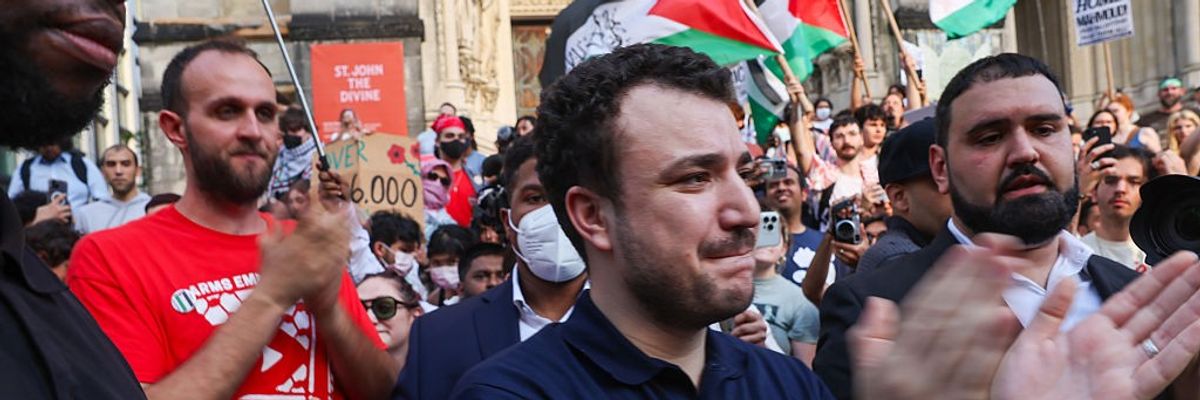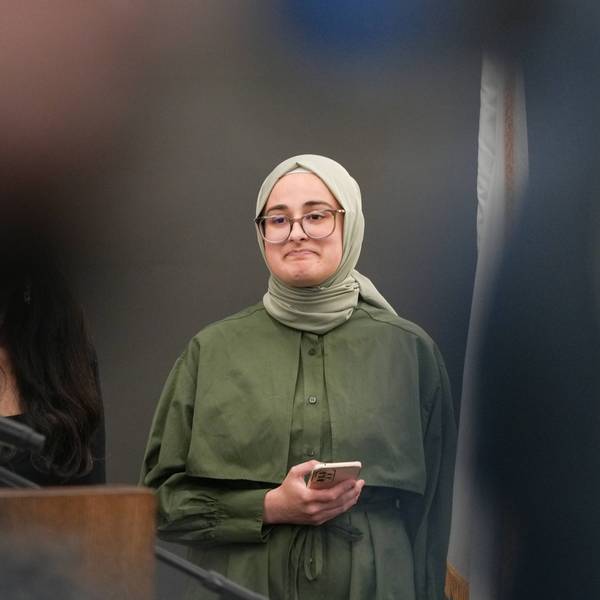
Palestinian activist Mahmoud Khalil marches with supporters after he was released from ICE detention during a rally outside of the Cathedral of St. John the Divine in Manhattan on June 22, 2025 in New York City.
Case Challenging Trump's 'Ideological Deportations' of Pro-Palestine Students Heads to Court
"The policy chills noncitizens from speaking and, by extension, robs these organizations and their U.S. citizen members of noncitizens' perspectives on a matter of significant public debate," the Knight Institute said in a statement on behalf of the plaintiffs.
The Trump administration, for the first time, had to defend its policy of deporting immigrants for their political views in court Monday.
A case filed by a group of professors will be heard in a Massachusetts federal court. The lawsuit challenges attempts by the Trump administration to arrest and remove foreign-born college students from the country based purely on their pro-Palestine speech.
Though hundreds of cases have been filed against the Trump administration since January, this is one of very few that has reached the trial phase.
The case was filed in March by Columbia University's Knight First Amendment Institute on behalf of the American Association of University Professors (AAUP); AAUP's Harvard, NYU, and Rutgers campus chapters; and the Middle East Studies Association.
It is one of half a dozen other lawsuits filed following the arrest of Columbia graduate student and protest leader Mahmoud Khalil, who was abducted in the dead of night by plainclothes ICE officers and shipped to a detention center for nearly three months.
Khalil and several other students had their legal immigration status revoked not for having committed any crime, but because the Trump administration deemed their views at odds with the "foreign policy objective[s]" of the United States.
Secretary of State Marco Rubio, the defendant in this case, has acknowledged stripping the legal status of hundreds of student protesters based on their speech.
"The policy chills noncitizens from speaking and, by extension, robs these organizations and their U.S. citizen members of noncitizens' perspectives on a matter of significant public debate," the Knight Institute said in a statement on behalf of the plaintiffs.
In a pre-trial brief, the group argued that this "ideological deportation policy" illegally discriminates against students and faculty based on their pro-Palestinian viewpoints.
"The First Amendment framework that applies is straightforward," the brief said. "If a regulation of speech discriminates based on content or viewpoint, then the regulation is 'presumptively unconstitutional' unless the government demonstrates that it is 'narrowly tailored to serve compelling state interests.'"
The plaintiffs argue that the intent behind the Trump administration's stripping of green cards and visas from legal holders was to punish speech they found disfavorable and to coerce others into silence.
"Noncitizen members of the AAUP have been chilled by these ideological deportations and forced to self-censor in a variety of different ways, and citizen members have been harmed as a result, because they have been deprived of the insights and engagement of their non-citizen students and colleagues," the brief said.
They cited examples of professors scrubbing their social media accounts to remove commentary on the Israel-Palestine conflict, abandoning research on the Middle East that could prove too "nuanced" for the administration's liking, and even cancelling international travel for academic opportunities for fear of being disallowed entry back into the country.
"The First Amendment does not permit government officials to use the power of their office to silence critics and suppress speech they don’t like," said Andrew Manuel Crespo, a Harvard Law professor and general counsel of the AAUP-Harvard Faculty Chapter.
The AAUP lawsuit marks the first time the Trump administration will defend its use of deportations for political speech in court. But it is not the first time the courts will rule on its attacks against higher education.
Courts have blocked the Trump administration's efforts to ban Harvard from hosting foreign students and strip its funding, saying the measures violated due process.
While the case over deportations deals with non-citizens, AAUP President Todd Wolfson said it has implications for free speech for everyone in America.
"The Trump administration is going after international scholars and students who speak their minds about Palestine, but make no mistake: they won't stop there," Wolfson said. "They'll come next for those who teach the history of slavery or who provide gender-affirming health care or who research climate change or who counsel students about their reproductive choices. We all have to draw a line together—as the old labor movement slogan says: an injury to one is an injury to all."
An Urgent Message From Our Co-Founder
Dear Common Dreams reader, The U.S. is on a fast track to authoritarianism like nothing I've ever seen. Meanwhile, corporate news outlets are utterly capitulating to Trump, twisting their coverage to avoid drawing his ire while lining up to stuff cash in his pockets. That's why I believe that Common Dreams is doing the best and most consequential reporting that we've ever done. Our small but mighty team is a progressive reporting powerhouse, covering the news every day that the corporate media never will. Our mission has always been simple: To inform. To inspire. And to ignite change for the common good. Now here's the key piece that I want all our readers to understand: None of this would be possible without your financial support. That's not just some fundraising cliche. It's the absolute and literal truth. We don't accept corporate advertising and never will. We don't have a paywall because we don't think people should be blocked from critical news based on their ability to pay. Everything we do is funded by the donations of readers like you. Will you donate now to help power the nonprofit, independent reporting of Common Dreams? Thank you for being a vital member of our community. Together, we can keep independent journalism alive when it’s needed most. - Craig Brown, Co-founder |
The Trump administration, for the first time, had to defend its policy of deporting immigrants for their political views in court Monday.
A case filed by a group of professors will be heard in a Massachusetts federal court. The lawsuit challenges attempts by the Trump administration to arrest and remove foreign-born college students from the country based purely on their pro-Palestine speech.
Though hundreds of cases have been filed against the Trump administration since January, this is one of very few that has reached the trial phase.
The case was filed in March by Columbia University's Knight First Amendment Institute on behalf of the American Association of University Professors (AAUP); AAUP's Harvard, NYU, and Rutgers campus chapters; and the Middle East Studies Association.
It is one of half a dozen other lawsuits filed following the arrest of Columbia graduate student and protest leader Mahmoud Khalil, who was abducted in the dead of night by plainclothes ICE officers and shipped to a detention center for nearly three months.
Khalil and several other students had their legal immigration status revoked not for having committed any crime, but because the Trump administration deemed their views at odds with the "foreign policy objective[s]" of the United States.
Secretary of State Marco Rubio, the defendant in this case, has acknowledged stripping the legal status of hundreds of student protesters based on their speech.
"The policy chills noncitizens from speaking and, by extension, robs these organizations and their U.S. citizen members of noncitizens' perspectives on a matter of significant public debate," the Knight Institute said in a statement on behalf of the plaintiffs.
In a pre-trial brief, the group argued that this "ideological deportation policy" illegally discriminates against students and faculty based on their pro-Palestinian viewpoints.
"The First Amendment framework that applies is straightforward," the brief said. "If a regulation of speech discriminates based on content or viewpoint, then the regulation is 'presumptively unconstitutional' unless the government demonstrates that it is 'narrowly tailored to serve compelling state interests.'"
The plaintiffs argue that the intent behind the Trump administration's stripping of green cards and visas from legal holders was to punish speech they found disfavorable and to coerce others into silence.
"Noncitizen members of the AAUP have been chilled by these ideological deportations and forced to self-censor in a variety of different ways, and citizen members have been harmed as a result, because they have been deprived of the insights and engagement of their non-citizen students and colleagues," the brief said.
They cited examples of professors scrubbing their social media accounts to remove commentary on the Israel-Palestine conflict, abandoning research on the Middle East that could prove too "nuanced" for the administration's liking, and even cancelling international travel for academic opportunities for fear of being disallowed entry back into the country.
"The First Amendment does not permit government officials to use the power of their office to silence critics and suppress speech they don’t like," said Andrew Manuel Crespo, a Harvard Law professor and general counsel of the AAUP-Harvard Faculty Chapter.
The AAUP lawsuit marks the first time the Trump administration will defend its use of deportations for political speech in court. But it is not the first time the courts will rule on its attacks against higher education.
Courts have blocked the Trump administration's efforts to ban Harvard from hosting foreign students and strip its funding, saying the measures violated due process.
While the case over deportations deals with non-citizens, AAUP President Todd Wolfson said it has implications for free speech for everyone in America.
"The Trump administration is going after international scholars and students who speak their minds about Palestine, but make no mistake: they won't stop there," Wolfson said. "They'll come next for those who teach the history of slavery or who provide gender-affirming health care or who research climate change or who counsel students about their reproductive choices. We all have to draw a line together—as the old labor movement slogan says: an injury to one is an injury to all."
The Trump administration, for the first time, had to defend its policy of deporting immigrants for their political views in court Monday.
A case filed by a group of professors will be heard in a Massachusetts federal court. The lawsuit challenges attempts by the Trump administration to arrest and remove foreign-born college students from the country based purely on their pro-Palestine speech.
Though hundreds of cases have been filed against the Trump administration since January, this is one of very few that has reached the trial phase.
The case was filed in March by Columbia University's Knight First Amendment Institute on behalf of the American Association of University Professors (AAUP); AAUP's Harvard, NYU, and Rutgers campus chapters; and the Middle East Studies Association.
It is one of half a dozen other lawsuits filed following the arrest of Columbia graduate student and protest leader Mahmoud Khalil, who was abducted in the dead of night by plainclothes ICE officers and shipped to a detention center for nearly three months.
Khalil and several other students had their legal immigration status revoked not for having committed any crime, but because the Trump administration deemed their views at odds with the "foreign policy objective[s]" of the United States.
Secretary of State Marco Rubio, the defendant in this case, has acknowledged stripping the legal status of hundreds of student protesters based on their speech.
"The policy chills noncitizens from speaking and, by extension, robs these organizations and their U.S. citizen members of noncitizens' perspectives on a matter of significant public debate," the Knight Institute said in a statement on behalf of the plaintiffs.
In a pre-trial brief, the group argued that this "ideological deportation policy" illegally discriminates against students and faculty based on their pro-Palestinian viewpoints.
"The First Amendment framework that applies is straightforward," the brief said. "If a regulation of speech discriminates based on content or viewpoint, then the regulation is 'presumptively unconstitutional' unless the government demonstrates that it is 'narrowly tailored to serve compelling state interests.'"
The plaintiffs argue that the intent behind the Trump administration's stripping of green cards and visas from legal holders was to punish speech they found disfavorable and to coerce others into silence.
"Noncitizen members of the AAUP have been chilled by these ideological deportations and forced to self-censor in a variety of different ways, and citizen members have been harmed as a result, because they have been deprived of the insights and engagement of their non-citizen students and colleagues," the brief said.
They cited examples of professors scrubbing their social media accounts to remove commentary on the Israel-Palestine conflict, abandoning research on the Middle East that could prove too "nuanced" for the administration's liking, and even cancelling international travel for academic opportunities for fear of being disallowed entry back into the country.
"The First Amendment does not permit government officials to use the power of their office to silence critics and suppress speech they don’t like," said Andrew Manuel Crespo, a Harvard Law professor and general counsel of the AAUP-Harvard Faculty Chapter.
The AAUP lawsuit marks the first time the Trump administration will defend its use of deportations for political speech in court. But it is not the first time the courts will rule on its attacks against higher education.
Courts have blocked the Trump administration's efforts to ban Harvard from hosting foreign students and strip its funding, saying the measures violated due process.
While the case over deportations deals with non-citizens, AAUP President Todd Wolfson said it has implications for free speech for everyone in America.
"The Trump administration is going after international scholars and students who speak their minds about Palestine, but make no mistake: they won't stop there," Wolfson said. "They'll come next for those who teach the history of slavery or who provide gender-affirming health care or who research climate change or who counsel students about their reproductive choices. We all have to draw a line together—as the old labor movement slogan says: an injury to one is an injury to all."

